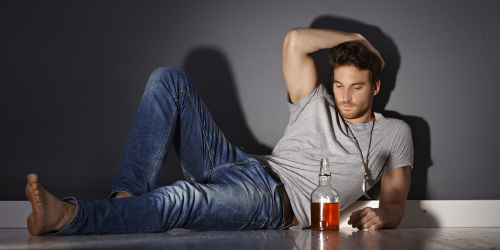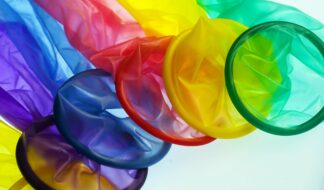By Christopher Treacy

It felt like I was circling the drain. I got stuck in a vicious cycle, allowing some evil mechanism within me to destroy everything I tried to achieve while it simultaneously lied to me and told me it was all harmless.
Eventually, I just stopped trying to achieve things altogether.
I may have been born in 1970, but the reality is that I'm just turning 28. I began drinking regularly when I was 15, and that's the maturity level I was still at when I quit drinking for what will hopefully be the last time, nearly 13 years ago.
Those of us that identify as recovering alcoholics can attest: in the beginning, booze offered a miraculous and magical transformation — and that's no exaggeration. Talk to other drunks in recovery, and they'll pinpoint a moment in time when alcohol turned a switch within them, thus solving a huge problem which, up until that point, had them writhing in non-specific agony… like a bug flipped on its back.
Often described as being "uncomfortable in my own skin," alcoholics will tell you they grew up fearing others, feeling alone in a crowd and lacking in self-esteem. There's a disconcerting, widely shared feeling that we were all absent on a special school day when our peers received a handbook with directions about living life. We all had different home environments, but shared a common suspicion: something essential was missing.
In one fell swoop, alcohol changed all this. The lessons of the mysterious, aforementioned handbook were revealed. The missing link was located. Hooray.
Basically, drinking did things for me that nothing else could. Alcoholism runs on one side of my family, and I do indeed believe it's a hereditary disease. But I was only vaguely aware of what that meant when I started. And it didn't go well at first, but I was undeterred.
I drank too much too quickly, got sick, behaved like an ass, and got into trouble. Never once did I think, "Yikes, maybe this isn't for me." On the contrary, drinking was somehow a destination for me prior to the first sip, and bad outcomes merely presented a challenge: I must learn to do this better. And so I did.
From 15 to 30 years old, I pursued drinking the way many straight men pursue sports. The fact that athleticism bored me no longer mattered; I'd found my game and developed impressive skills. I made new friends. We hung out and drank. As a suburban, 1980s teen, a passable fake ID could be made on the library copy machine. By 16, I was spending weekend nights in a local bar, drinking cheaply, and having a blast.
There were drugs, too, and my involvement with them got me expelled from my public high school. I was shipped off to a boarding school in Vermont, which only helped me hone my craft, delightfully under-supervised up in the middle of nowhere. When I got to college, I felt like I'd truly arrived. I slept with whoever would have me, gender notwithstanding, and I functioned famously through the haze. It was all part of the challenge.
But right around college graduation, I became riddled with anxiety. Alcohol began making its slow, painful transition from asset to liability. Faced with pursuing a career, I chose instead to work "begrudgingly and at half-steam" (from AA literature).
My peers made strides, fell in love and bought houses. I opted to run around in the bars where plenty of solace could be found from other gays who were adjusting about as well as I was. Bars are where so many of us establish our sexual identity, and they can be a great resource. But that sense of comfort can turn into quicksand. Suddenly, you realize you've been stuck on a stool for a few years.
With only one exception, boyfriends were fleeting. I bitched about it, but the truth was that I didn't want anyone getting too close, lest they see how pathetic I was becoming. Copious amounts of daydreaming (and lost time due to frequent blackouts) transpired instead, while I developed a "work hard, play hard" ethic waiting tables.
My employment sell-by date averaged nine months, by which time I would have gotten busted skimming money or stealing liquor. I lied, cheated and stole to keep it all going. My appetite for drugs increased, eventually landing me with a nasty cocaine habit that took a wrecking ball to any semblance of functionality I'd previously established. I spent multiple nights in jail, repeatedly getting picked up wobbling around Boston's theater district, blind-drunk and looking to score. I made my way into a few crack houses and developed a depraved after-hours persona that I worked hard to obscure, even from other drinking buddies.
I prided myself on staying skinny and showing up to work regardless of the damage — blackened eyes, split cheeks, broken eyeglasses. Drama seemed to find me. All the while, I could hear my inebriated gay peers hissing in hushed tones around me, "She's a messss!" It was mortifying. A frustrating double standard was revealed between gays who kept up a believable facade of health and those of us that no longer bothered. I was a castoff from my own kind.
And by the time I turned 30, I couldn't hide that drinking was calling all the shots even if I'd wanted to. Sober alcoholics often refer to this as the moment "when booze stopped working." The magic was over, the switch was broken, and yet I still craved to drink. True, I'd developed other addictions along the way, but alcohol facilitated all of them.
The most frightening realization came when I continued to drink despite being determined not to: I had no choice anymore. I had to find a way not to have that first drink, since it seemed like the only way to prevent all those other awful decisions from getting made. I needed to develop faith in something beyond myself (and beyond booze) that could help keep me from drinking, and it took a while for me to stop kicking and screaming long enough to find it.
Too many people believe that getting sober is just about quitting drinking and using drugs. While that surely plays a large role in the process, the real work of sobriety is in re-learning how to live without those things once you've put them down.
Alarming new findings from the U.S. Centers for Disease Control and Prevention about our community struggles with addiction show that we're just as mired in this struggle as we've ever been. Hazelden Betty Ford Foundation director Buster Ross recently summarized the new research, reporting that when and if we wash up for treatment, we're much more likely to come with additional baggage, including a history of physical, emotional and/or sexual abuse. Additionally, we're dogged with cross addictions and mental health problems, and are more inclined to repeatedly seek treatment, speaking to a lower success rate of ongoing sobriety.
Curiously, coming out to a more accepting world isn't necessarily having the impact on our self-medication issues that one might assume. Studies suggest that LGBTQ youths come out faster than previous generations, potentially rushing the internal process of acceptance. The assumption has always been that if the culture is at peace with us, then we're okay also… but that may not mirror one's interior dialogue at all.
Furthermore, research coming out of Texas Tech University's Department of Psychological Sciences and the Chicago Health and life Experience of Women (CHLEW) supports the idea that fluid sexuality may actually be a trigger for what's deemed as 'dangerous drinking' in women. It's an extension of something called Cognitive Dissonance Theory, which examines the discomfort that arises when our behaviors don't align with our beliefs and attitudes. Self-medication is one way of coping with these inner discrepancies, but folks predisposed to alcoholism can get stuck in a pattern, unable to emerge with a revised self identity. Instead, they just keep drinking.
As gay men and women looking for ways of understanding how we fit into the world around us, we're presented with challenges that mimic those of the budding alcoholic: we feel apart, lonely… at a loss. At a time when our straight friends are dating and engaging in various rites of passage, we're searching for ways just to feel comfortable in our skin. Almighty alcohol creates a warm, fuzzy camaraderie ‚Äì a buffer ‚Äì that seems like a huge problem solver. But there are no real shortcuts, and that's something we have to discover individually. Unfortunately, a huge derailment sometimes ensues.
Find a listing of LGBT welcoming meetings here https://www.pridesource.com/article.html?article=10879
or call A.A. HOTLINE PHONE: 313-831-5550 (Wayne); 810-541-6565 (S. Oakland); 248-332-3521 (N. Oakland)










